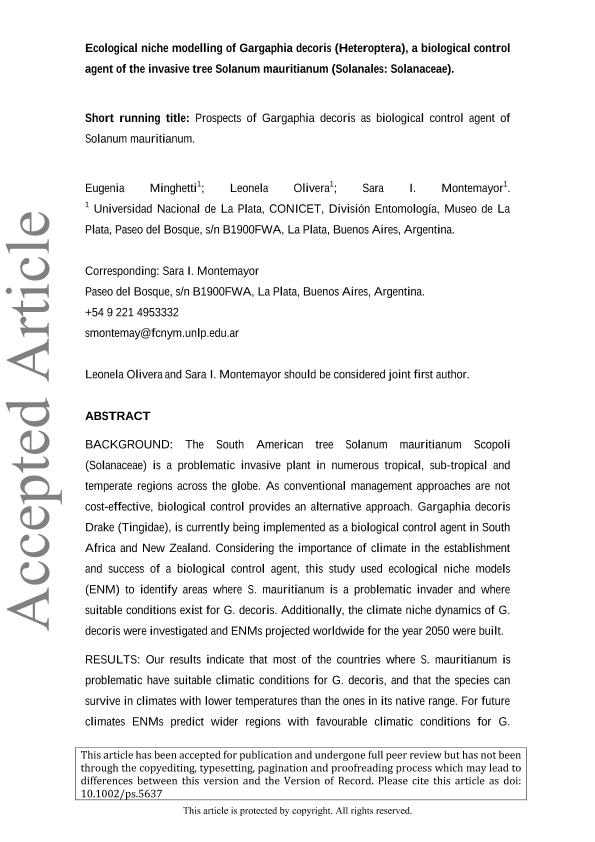Mostrar el registro sencillo del ítem
dc.contributor.author
Minghetti, Eugenia

dc.contributor.author
Olivera, Leonela

dc.contributor.author
Montemayor Borsinger, Sara Itzel

dc.date.available
2021-03-30T11:43:53Z
dc.date.issued
2020-04
dc.identifier.citation
Minghetti, Eugenia; Olivera, Leonela; Montemayor Borsinger, Sara Itzel; Ecological niche modelling of Gargaphia decoris (Heteroptera), a biological control agent of the invasive tree Solanum mauritianum (Solanales: Solanaceae); John Wiley & Sons Ltd; Pest Management Science; 76; 4; 4-2020; 1273-1281
dc.identifier.issn
1526-498X
dc.identifier.uri
http://hdl.handle.net/11336/129207
dc.description.abstract
BACKGROUND: The South American tree Solanum mauritianum Scopoli (Solanaceae) is a problematic invasive plant in numerous tropical, subtropical and temperate regions around the globe. Because conventional management approaches are not cost-effective, biological control provides an alternative approach. Gargaphia decoris Drake (Tingidae) is currently used as a biological control agent in South Africa and New Zealand. Considering the importance of climate in the establishment and success of a biological control agent, this study used ecological niche models (ENM) to identify areas where S. mauritianum is a problematic invader and where suitable conditions exist for G. decoris. Additionally, the climate niche dynamics of G. decoris were investigated and ENMs projected worldwide for the year 2050 were built. RESULTS: Our results indicate that most of the countries where S. mauritianum is problematic have suitable climatic conditions for G. decoris, and that the species can survive in climates with temperatures lower than those in its native range. For future climates, ENMs predict wider regions with favourable climatic conditions for G. decoris. CONCLUSION: Considering the results of this study, the prospects of using G. decoris as a biological control agent are good under current and future climates. Introduction of this agent could be considered in affected countries where it has not been released. © 2019 Society of Chemical Industry.
dc.format
application/pdf
dc.language.iso
eng
dc.publisher
John Wiley & Sons Ltd

dc.rights
info:eu-repo/semantics/openAccess
dc.rights.uri
https://creativecommons.org/licenses/by-nc-sa/2.5/ar/
dc.subject
BUGWEED
dc.subject
LACE BUG
dc.subject
POTENTIAL DISTRIBUTION
dc.subject
TINGIDAE
dc.subject
WOOLLY NIGHTSHADE
dc.subject.classification
Zoología, Ornitología, Entomología, Etología

dc.subject.classification
Ciencias Biológicas

dc.subject.classification
CIENCIAS NATURALES Y EXACTAS

dc.title
Ecological niche modelling of Gargaphia decoris (Heteroptera), a biological control agent of the invasive tree Solanum mauritianum (Solanales: Solanaceae)
dc.type
info:eu-repo/semantics/article
dc.type
info:ar-repo/semantics/artículo
dc.type
info:eu-repo/semantics/publishedVersion
dc.date.updated
2021-03-25T14:09:24Z
dc.journal.volume
76
dc.journal.number
4
dc.journal.pagination
1273-1281
dc.journal.pais
Reino Unido

dc.journal.ciudad
Londres
dc.description.fil
Fil: Minghetti, Eugenia. Universidad Nacional de La Plata. Facultad de Ciencias Naturales y Museo. División Entomología; Argentina. Consejo Nacional de Investigaciones Científicas y Técnicas. Centro Científico Tecnológico Conicet - La Plata; Argentina
dc.description.fil
Fil: Olivera, Leonela. Universidad Nacional de La Plata. Facultad de Ciencias Naturales y Museo. División Entomología; Argentina. Consejo Nacional de Investigaciones Científicas y Técnicas. Centro Científico Tecnológico Conicet - La Plata; Argentina
dc.description.fil
Fil: Montemayor Borsinger, Sara Itzel. Universidad Nacional de La Plata. Facultad de Ciencias Naturales y Museo. División Entomología; Argentina. Consejo Nacional de Investigaciones Científicas y Técnicas. Centro Científico Tecnológico Conicet - La Plata; Argentina
dc.journal.title
Pest Management Science

dc.relation.alternativeid
info:eu-repo/semantics/altIdentifier/url/https://onlinelibrary.wiley.com/doi/abs/10.1002/ps.5637
dc.relation.alternativeid
info:eu-repo/semantics/altIdentifier/doi/https://doi.org/10.1002/ps.5637
Archivos asociados
